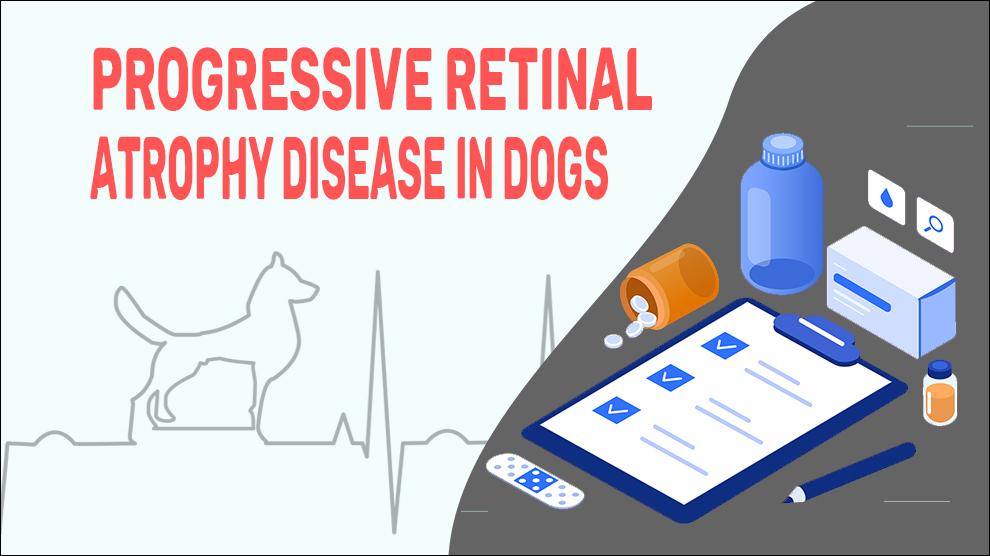What Is Progressive Retinal Atrophy In Dogs?
Progressive retinal atrophy (PRA) is an inherited, non-inflammatory, bilateral, progressive retinal degenerative disease of the photoreceptors (rods, cones, and/or the pigmented layer) that ends in blindness.
The retina is a neuroectodermal tunic layer at the back of the eye that senses light and sends signals to the brain. PRA affects the retina starting with the deterioration of the night vision and then, degeneration of day vision leading to total blindness. The development of this condition is gradual, and the owners may not even be aware of their dog’s sight is getting damaged. Due to the gradual worsening, the dog also will also adapt to the condition, adjusting by using other senses to allow him to move around.
This is not painful by itself, affects both eyes, and causes blindness, although not necessarily at the same time. It is rare for dogs to have retinal atrophy from birth but sometimes atrophied retina that develops in puppyhood are usually connected with severe, hereditary birth defects in the eye.
In general, there are 2 types of PRA that exist early-onset and late-onset.
Early-onset PRA’s are distinguished by photoreceptor dysplasias wherein most photoreceptors don’t develop normally. On the other hand, Late-onset PRA’s are which photoreceptors develop normally and they have early degeneration. A dog with this hereditary condition starts exhibiting signs of retinal atrophy only after three years of age.
Symptoms Of Progressive Retinal Atrophy In Dogs
- Eyes cloudy look/grey color with a slight sheen
- Night blindness
- Day blindness
- Bumping into objects
- Dilated pupils
- Difficulty seeing in bright light
- Cataracts
- Unable to follow hand signals/commands
Treatment Options For Progressive Retinal Atrophy In Dogs
There is no proper treatment available for PRA
- Antioxidant treatment: Slow down the rate of the disease in the retina
- Carotenoid supplement Lutein: Early stages of the disease
- Supportive therapy
- Oral and/or Systemic Antibiotics
- Lubricant ointments and/or antibiotic ointments
Home Remedies For Progressive Retinal Atrophy In Dogs
- Gently wash the eyelids using baby shampoo and/or applying warm compresses to the eyes.
- Apply chamomile tea cold compress (it has mild antiseptic properties) and clean the affected eye.
How To Prevent Progressive Retinal Atrophy In Dogs?
There is no way to prevent PRA.
Prevention of Retinal atrophy is a hereditary concern. To avoid passing the condition on to the next generation, not only dogs with PRA but also the first-degree relatives (parents and littermates) should not also be bred.
Always be aware of the risk factors associated with PRA. Educate yourself about the signs and symptoms.
Regularly monitor the symptoms and contact your vet if you note any significant new symptoms or changes in their vision.
Affected Dog Breeds Of Progressive Retinal Atrophy
Cocker Spaniel, Poodle, Labrador Retriever, Golden Retriever, Border Collie, Collie, Shetland Sheepdog, English Cocker Spaniel, English Springer Spaniel, Chesapeake Bay Retriever, Cavalier King Charles Spaniel, Briard
Causes And Prognosis For Progressive Retinal Atrophy In Dogs
1. Causes:
- Progressive retinal atrophy is a hereditary condition due to an autosomal recessive gene carried by any of the parent dogs.
- This condition usually affects the vision of dogs within 6 to 8 years of age.
2. Types:
Generalized progressive retinal atrophy (GPRA): GPRA is the most prevalent type of PRA and can happen in dogs of any age. In GPRA early-onset, the photoreceptors are not correctly formed and the dog has vision problems. In late-onset GPRA, the vision loss happens gradually since the photoreceptors are developed properly but instead worsen after some time.
Central progressive retinal atrophy (CPRA) or retinal pigment epithelial dystrophy (RPED): This is an uncommon type of PRA. CPRA causes the retinal pigmented layer to worsen and consequently makes it hard for the dog to see in poor light. Mostly, this type does not result in blindness and is most often seen in aged dogs.
3. Mortality:
There is no documented mortality due to this condition.
4. Diagnosis:
- Complete blood count (CBC)
- Biochemical profile
- Ocular ultrasound
- ERG or Electroretinogram to check the dog’s vision
- Tonometry, slit lamp, and fundoscopy
- Inner eye gonioscopy
5. Prognosis:
The prognosis for dogs diagnosed with retinal atrophy has never been better with today's medications available. Most dogs enjoy a pain-free life with careful attention and monitoring.
If the condition is not diagnosed earlier in the course of the disease or if it has progressed to deep detachment, the pet may lose its vision or may not respond fully to the treatment.
When To See A Vet For Progressive Retinal Atrophy In Dogs?
Contact your vet right away, if you notice any of the following:
- Eyes cloudy look/grey color with a slight sheen
- Night blindness
- Day blindness
Food Suggestions For Progressive Retinal Atrophy In Dogs
- Sea foods such as salmon, Sardines, Herring, Anchovies, lake whitefish, herring, walleye, etc.
- Nonmeat/plant protein sources such as nuts, Lentils, Beans, Eggs, etc.
- Leafy greens such as spinach, kale, watercress, etc.
- Omega-3 oily fishes such as salmon, tuna, cod, etc.
- Carotenoid foods: Carrots, sweet potatoes, Egg yolks, kale, spinach, pumpkin.
- Zinc foods such as Pork, tuna, and Oysters.
- Antioxidants such as Blueberries, Broccoli, cabbage, and carrots.
Conclusion
The prognosis for return of vision is poor to guarded. After the initial treatment, monthly checkups are recommended and retinal atrophy has to be closely monitored. Eye medications have to be administered according to the vet’s instructions.

















